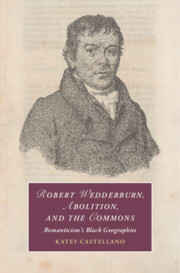Book contents
- Robert Wedderburn, Abolition, and the Commons
- Cambridge Studies in Romanticism
- Robert Wedderburn, Abolition, and the Commons
- Copyright page
- Contents
- Figures
- Acknowledgments
- Introduction
- Chapter 1 Against Private Property
- Chapter 2 From Plantation to Prison
- Chapter 3 Black Women’s Abolitionist Geographies in The Horrors of Slavery and The History of Mary Prince
- Chapter 4 Provisions and Pigs
- Chapter 5 Maroon Settlements as Abolitionist Commons
- Chapter 6 Emancipation as the Enclosure of “Waste Fertility”
- Conclusion
- Notes
- Bibliography
- Index
- Cambridge Studies In Romanticism
Chapter 4 - Provisions and Pigs
Black Geographies in Matthew Lewis’s Journal of a West India Proprietor
Published online by Cambridge University Press: 09 January 2025
- Robert Wedderburn, Abolition, and the Commons
- Cambridge Studies in Romanticism
- Robert Wedderburn, Abolition, and the Commons
- Copyright page
- Contents
- Figures
- Acknowledgments
- Introduction
- Chapter 1 Against Private Property
- Chapter 2 From Plantation to Prison
- Chapter 3 Black Women’s Abolitionist Geographies in The Horrors of Slavery and The History of Mary Prince
- Chapter 4 Provisions and Pigs
- Chapter 5 Maroon Settlements as Abolitionist Commons
- Chapter 6 Emancipation as the Enclosure of “Waste Fertility”
- Conclusion
- Notes
- Bibliography
- Index
- Cambridge Studies In Romanticism
Summary
In his Journal of a West India Proprietor, Matthew Lewis documented numerous encounters with the people he enslaved. Guided by Wedderburn’s argument that the provision grounds must be guarded “above all” for Black liberation, this chapter argues that tensions over provision grounds permeated Lewis’s encounters. After granting an additional day per week on the provision grounds as “a matter of right,” Lewis documented that enslaved people were growing poisons, unleashing fires, harboring crowds of destructive livestock, and providing sustenance for self-liberated Black people. Despite noticing these dangers, Lewis wrote to William Wilberforce detailing a plan for emancipating the people he enslaved by giving them his plantation, a proposal feared to be “dangerous to the island.” Lewis’s Journal recorded that his plantations were undermined, not by overt rebellion, but rather by the success of the Black ecological project: The botanical and animal ecologies of the provision grounds were anticipatory abolitionist commons that would be drawn upon in the coming emancipation.
Keywords
- Type
- Chapter
- Information
- Robert Wedderburn, Abolition, and the CommonsRomanticism's Black Geographies, pp. 81 - 100Publisher: Cambridge University PressPrint publication year: 2025

